|
ISCB Officer
Elections To Begin Soon
Vice President Candidates
Secretary Candidates
Treasurer Candidates
In February of this year Dietlind Gerloff, ISCB Nominations Committee
Chair, put out a call for nominations to fill Board of Directors
and Officer positions to take office in January, 2005. At the time
of this writing the current board is electing the new board members,
with an announcement to be made at the Open ISCB Business Meeting
during ISMB/ECCB in Glasgow, Scotland on August 1.
The election of Officers is determined by a vote of the membership
of the Society per the following schedule:
August 23
Final Officer candidates announced to membership with invitation
to address questions to candidates
August 23- September 22
Q&A period between Officer candidates and members
September 22
Send Election materials to membership; in order to vote in the current
election cycle, a member must have joined ISCB by this date.
September 22 - October 6:
Members cast votes on web site
October 11:
Final results announced to membership
October - January:
Training Period for new Officers and Directors
January 21, 2005
New Officers take office
The following members have been certified eligible to run, and have
completed the candidate statement with the information below. Please
review their statements as you consider your upcoming opportunity
to vote. Then be sure to respond to the elections notice on September
22 by casting your vote online.
Vice
President Candidates
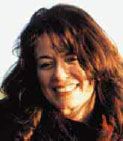 Janice
I Glasgow Janice
I Glasgow
Professor and Research Chair
School of Computing
Queen's University
janice@cs.queensu.ca
Topics of Research:
My research involves the application of artificial intelligence
techniques to the problem of determining protein structure. Approaches
using crystallographic data and contact maps are currently being
considered.
Major Issues Facing ISCB:
The major issue is the rapid growth of the field and how to maintain
a cohesive society that can work cooperatively with smaller national
groups.
Plans to Address Issues:
I believe one way to address the issue is to consider ways in which
the societies major conferences can work together and with more
local conferences. It may be that ISMB, for example, not occur every
year but bi-yearly so the focus for the other years can be more
local/national.
Non-Scientific Expertise:
• Member of editorial boards for several journals
• Previous Head of Department
• Previous President Canadian Society for Computational Studies
of Intelligence
• Previous Vice-Chair International Federation for Information
Processing (AI)
• Founder of Undergraduate Program in Biomedical Computing
at Queen's University
Service to Field or ISCB:
• Member Board of Directors 1997 - 2000
• Member Conference Committee 2000 - present
• Program Chair ISMB 1998 Program Co-Chair ISMB 2002
• Member Program Committee ISMB 2001
Committees of Interest:
• Conferences (Have already served on this committee for several
years.)
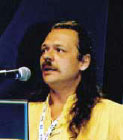 Burkhard
Rost Burkhard
Rost
Associate Professor
Columbia University, Biochemistry
rost@columbia.edu
Topics of Research:
We try to predict aspects of protein structure and function from
the evolutionary information contained in families of protein sequences.
The main current projects are to (1) predict functional classes
for orphans, (2) the sub-cellular localization from sequence, and
(3) protein-protein, and protein-substrate interactions from sequence
and predicted structure. We also continue to work on structure prediction.
Major Issues Facing ISCB:
• Consolidation of society (financial/definition of what we
want to gain from it/addition of more young members)
• Strengthen connections to experimental biologists, manage
reach-out/close collaboration to related societies (Systems Biology)
• Improve scientific visibility.
Plans to Address Issues:
• Consolidation: Improve meetings of the society, in particular
of ISMB - strengthen regional meetings, avoid break-off of groups
(EECB) where possible - bring new members in by making it more appealing
for them to join (e.g. let them vote what will be presented at ISMB)
- give BOD and related people more time to discuss principle problems/issues/solutions
• Connections to related fields: Organize common meetings with
other biologists and related disciplines, possibly find common publication
forum
• Scientific visibility: Stronger support for Outreach committee
- find new media (to coordinate with publication/education committee)
Non-Scientific Expertise:
SAB of LION Biosciences; associated with the early stages of beginning
LION Biosciences; association with/work for Union of Concerned Scientists
(in the 80s)
Service to Field or ISCB:
• ISMB Program Committee since 1995
• ISMB co-organizer 2002
• ISMB Area Chair since 2002
• ISCB BOD since 2002
• ISCB committee member (conferences/nominations/paper reviews-chair)
Committees of Interest:
Publications, Conferences, Education, Nominations
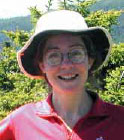 Barbara
Bryant Barbara
Bryant
Associate Director
Millennium Pharmaceuticals
bryant@mpi.com
Topics of Research:
I analyze microarray data from clinical samples to find patterns
of gene expression predictive of response to a drug therapy.
Major Issues Facing ISCB:
• ISCB members and board have shown interest in having a voice
in public policy. ISCB joined the Federation of American Societies
for Experimental Biology (FASEB) in order to participate in their
well-established and effective public affairs function. ISCB needs
to connect its members more directly to the FASEB public affairs
activities.
• ISCB also needs to identify ways to have such a voice in
other countries.
• ISCB had a tough year financially in 2003. We need to be
on good financial footing going forward.
• ISCB needs to have more of its members actively participating
in its business. While ISCB has a very small staff, most of the
work must be done by volunteers.
• ISCB needs to work more successfully with other groups and
organizations.
• ISCB needs to continue to increase the quality of its conferences
and journal.
Plans to Address Issues:
• ISCB needs to set up more electronic and face-to-face mechanisms
to communicate with its members on public affairs issues.
• ISCB needs to identify and tackle issues of interest to the
membership.
• ISCB needs to engage members from many countries in public
affairs, and identify organizations with whom we could partner in
affecting science policy.
• ISCB needs to diversify its sources of income, not relying
so heavily on ISMB alone. The board of directors should be educated
about and feel accountable for the financial health of the Society.
• ISCB needs to nurture its new Student Council, and find other
ways to bring members onto committees and task forces. The governance
structure of ISCB needs to be revisited in order to set up clear
paths for development of individuals and participation by members.
• ISCB needs to aggressively identify potential partner and
member organizations, and work with them to identify and carry out
win-win relationships.
• ISCB needs to consider and adopt out-of-the-box ideas for
change in both conferences and publications. We need to aggressively
recruit biologists into our meetings and journal.
Non-Scientific Expertise:
• I have training and experience in facilitation and mediation.
• I served on the board of directors, including stints as Vice-President
and President, of the non-profit, collaborative Cambridgeport Children’s
Center.
• I have ten years of management experience in industry.
• My strengths are listening, capturing people’s concerns
and ideas, and framing the issues.
Service to Field or ISCB:
• I have served on the board of ISCB for several years, including
two and one half years as Secretary, on the Executive Committee.
• I was appointed the ISCB representative to FASEB’s board
of directors. At FASEB, I sit on the Science Policy Committee, and
I’ve been asked to chair the Corporate Relations committee,
where we’ve taken on the tasks of identifying areas of joint
interest between FASEB and industry, and drafting guidelines for
FASEB’s interactions with industry.
• I’ve participated in strategic planning exercises for
both ISCB and FASEB.
• I have acted as reviewer in the field of computational biology
for NIH, conferences, journals, and the development of master’s
degree programs.
• And, last but not least, I’ve organized the orienteering
ice-breaker at the last three ISMB conferences.
Committees of Interest:
Publications, Conferences, Public Affairs & Policies, Affiliates
& SIGs, Governance, Executive Committee (as Secretary since
2001)
Secretary
Candidate (uncontested)
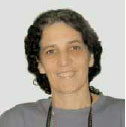 Michal
Linial Michal
Linial
Professor of Biochemistry and Molecular Biology
Dept of Biological Chemistry
The Hebrew University of Jerusalem
michall@cc.huji.ac.il
Topics of Research:
• Cell biological aspects of neuronal presynaptic functions
and control of neurotransmitter release.
• Molecular and Genomics methodologies in the study of developing
neurons and secretory model systems.
• Bioinformatics – Large-scale studies of biological sequences
and their global organization.
• Genomics and Proteomics
Major Issues Facing ISCB:
• Bridging the gap between 'classical biology' and 'computational
oriented research’ and ‘technological advances’ by
increasing the dialog.
• Helping in introducing ‘neglected topics’ to the
field of computational biology (i.e., computational neuroscience)
• Strong support for knowledge exchange and expertise sharing.
Plans to Address Issues:
• Supporting summer school, tutorials and focused advanced
discussion groups.
• Merging with other regional major activities.
• Students exchange programs.
• Adding high quality reviews to publications in the field.
Non-Scientific Expertise:
• A 'problem solver'
• Large experience in organizing meeting at different level.
• Leading educational programs.
Service to Field or ISCB:
• ISCB Board of Directors -from January 2004
• Steering committee in ESF2002, ECCB2003
• Program committee in RECOMB, ISMB in recent years
Committees of Interest:
Conferences, Education
Treasurer
Candidate (uncontested)
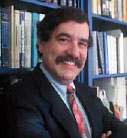 David
M Rocke David
M Rocke
Professor
Institute for Data Analysis and Visualization
University of California, Davis
dmrocke@ucdavis.edu
Topics of Research:
The main focus of my research is the development of methods for
the design and analysis of experiments using high-throughput assay
data such as gene expression arrays, proteomics by mass spec, and
metabolomics by NMR spectroscopy.
Major Issues Facing ISCB:
• The finances of ISCB are not yet on a firm footing. They
are too dependent on a single meeting (ISMB) and the present revenues
are not sufficient to sustain the needed growth of the society.
• The organization of ISCB needs some improvements to better
meet the goals of the society.
• We need to continue to improve the ISCB sponsored publications.
We need to explore the eventual establishment of additional high-quality
publication outlets for our work.
• We should explore more extensive cooperation with other related
professional societies, including joint sponsorship of meetings
and possibly journals. These may include societies from both the
biological side (such as our fellow FASEB societies) and from the
computational/mathematical/statistical side such as ACM, IEEE, SIAM,
and ASA.
• We should assist in developing curricula and publications
to further education in computational biology and bioinformatics.
Plans to Address Issues:
I believe that we are beginning as a BOD to address many of these
issues. I think an important additional route to improvement is
to gain information from our sister societies both in biology and
in computation/mathematics/statistics. How are they financed? What
services do they provide for members? How is the board and staff
organized? How are committees appointed? We need to investigate
more extensively the opinions of our members on what ISCB can do
for them and for the discipline. We should conduct a carefully-planned,
scientifically-designed survey of members and potential members
(such as attendees at relevant meetings) to help in the already
ongoing strategic planning effort.
Non-Scientific Expertise:
Although I am now appointed in the School of Medicine and the College
of Engineering at UC Davis, I spent 25 years teaching statistics
and management science in schools of business. Through teaching,
seminars, and some formal course work, I have acquired a working
knowledge of the basic business disciplines, including finance,
accounting, and management information systems. I now manage a research
center with a $5 million budget, and have been Vice-Chair of my
main department. I have also been Treasurer of ISCB for two and
a half years, and have a good idea of the financial and organizational
challenges we face.
Service to Field or ISCB:
• I have been Treasurer of ISCB since January 2002.
• As a member of the Executive Committee of the BOD, I have
been involved in all major decisions.
• I am chair of the Finance Committee of the ISCB, and am helping
with the financial aspects of ISMB.
Committees of Interest:
Publications, Conferences, Finance, Public Affairs & Policies
|


 Janice
I Glasgow
Janice
I Glasgow Burkhard
Rost
Burkhard
Rost Barbara
Bryant
Barbara
Bryant Michal
Linial
Michal
Linial David
M Rocke
David
M Rocke